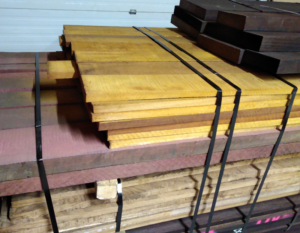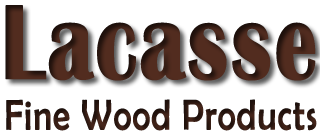We carry a wide range of wood species, from around the world to feed YOUR and MY wood addiction! Note that I won’t sell you any wood unless you agree to come back and show me what you’re making 🙂
INVENTORY:

Exotic Wood for Craft Woodworkers
Domestic Species: For the most common species, like oak, maple and poplar, we typically have inventory of the standard 3/4″ thickness in various widths from 3/4″ x 1.5″ up to 3/4″ x 7.5″ and occasionally wider. Other thicknesses like a full 1″ for stairs and window sills , or 1.5″ for wood countertops, stair stringers and/or fireplace mantles, are prepared on an order by order basic as each clients needs are typically quite specific.
Other domestic species like walnut and cherry, are most often sold in a rough , or semi rough state for crafters making everything from wood jewelry boxes to cutting boards. A small selection of dressed 3/4″ thick material, optimized for width… 2-5′ long is available …. for those clients that do not have access to a thickness planer but want to experiment with these beautiful native species.
Exotic Woods: everything from Bloodwood to Zebrawood, are available in full length NOT planed (rough) boards. Shorter boards (typically 18″ – 36″ ) are dressed to thickness (D2S), for woodcrafters that have only a need for a small board or again, no access to a thickness planer. A few species are available as turning squares for peppermills, pens and bottle stoppers etc.
Check the ‘species specific page’ where we have tried to provide as much detail as possible in regards to sizes we have available, for each type of wood AND some good/bad details about using a particular wood species. Having said that, here’s a few ideas on choosing a particular species:
Appearance Attributes:
- Grainy?? look at the way a piece of maple VS a piece of oak stains… the former is fairly uniform in colour, whereas oak, ash and elm show dramatic growth rings.
- colour?? and most importantly is colour retention! aging with sun exposure?
- figure?? curly, birdseye or fleck .. choosing these options and you really know you’re an addict.
- Quartered, Rift or Regular cut.. relative to growth rings alters the grain pattern especially common when talking about white oak and fir.
Machineability:
- density: the Janka rating for flooring will certainly give you an idea about density and reflect the difficulty of cutting and sanding any particular species of wood
- cell growth: for example birdseye maple is harder to machine because the wood cells are growing in strange and circular patterns and sawblades and router bits find this more challenging to machine
- sugar content: hard maple from maple syrup fame, is harder to machine without leaving burn marks, as the wood’s sugar content caramelizes
- gluing: woods like teak, require special techniques to accommodate its natural oils
- finishing: some woods are easier to stain/finish
Price:
- domestic species are typically under $10.00/bf
- exotic species are more often +/- $20.00
